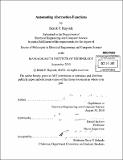Automating abstraction functions
Author(s)
Rayside, Derek F
DownloadFull printable version (9.899Mb)
Other Contributors
Massachusetts Institute of Technology. Dept. of Electrical Engineering and Computer Science.
Advisor
Daniel Jackson.
Terms of use
Metadata
Show full item recordAbstract
Data abstraction has been the dominant structuring paradigm for programs for decades. The essence of a data abstraction is the abstraction function, which relates the concrete program representation to its abstract meaning. However, abstraction functions are not generally considered to be a part of the executing program. We propose that making abstraction functions an executable part of the program can enable programmers to write clearer and more concise programs with fewer errors. In particular, we show that the object equality and hashing operations (which programmers are required to write), can often be expressed more clearly and more concisely in terms of the abstract state of the object. Getting these methods right has proven to be difficult for programmers at all skill levels, from novice through expert. In a case study of the standard Java libraries we show that rewriting the code with explicit declarative abstraction functions (and generating equality and hashing methods automatically) removed object-contract compliance faults previously found by Pacheco et al. To make abstraction functions part of the executing program we develop four techniques for the dynamic evaluation of abstraction functions written in a declarative first-order logic with relations and transitive closure. We observe that the abstraction functions programmers write in practice may often be viewed as navigation queries on the heap, and two of our techniques exploit this insight to synthesize executable code from declarative abstraction functions. The performance of our research prototype is within striking distance of hand-written code.
Description
Thesis (Ph. D.)--Massachusetts Institute of Technology, Dept. of Electrical Engineering and Computer Science, 2010. Cataloged from PDF version of thesis. Includes bibliographical references (p. 109-119).
Date issued
2010Department
Massachusetts Institute of Technology. Department of Electrical Engineering and Computer SciencePublisher
Massachusetts Institute of Technology
Keywords
Electrical Engineering and Computer Science.